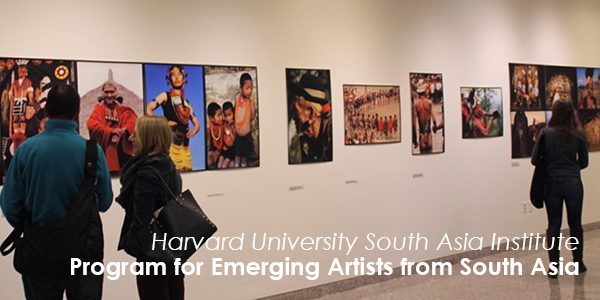About: The Harvard University South Asia Institute’s Arts Initiative welcomes applications from emerging artists in South Asia to come to Harvard University to participate in discourse with students and faculty on critical issues.
The Harvard University South Asia Institute (SAI) engages faculty and students through interdisciplinary programs to advance and deepen the teaching and research on global issues relevant to South Asia. SAI’s Arts Initiative serves as a resource across all disciplines to explore critical issues of South Asia through the lens of art and design.
Two artists will be selected for the academic year, including one fall artist and one spring artist. Selected artists will be invited to Harvard University in Cambridge, Ma for four days (a mutually convenient time will be decided upon by the selected artist and SAI). While our visiting emerging artists are on campus, SAI will support events and exhibits organized in collaboration with specific Harvard departments and faculty, and aligned with undergraduate course-content within Harvard.
In addition of $1,000 USD of discretionary funds for the artist’s exhibit related costs, the costs of each artist’s economy travel, accommodation for 4 nights, and meals will be provided.
Eligibility: To apply, you must be a South Asian artist of any medium who uses your work to draw attention to the areas of economic, policy, and social issues of your particular context. Particular attention will be paid to artists whose work is related to SAI’s ongoing research projects: https://mittalsouthasiainstitute.harvard.edu/projects/.
Your country of residence must be within South Asia (Afghanistan, Bangladesh, Bhutan, India, Myanmar, Nepal, Pakistan, or Sri Lanka), with particular preference for artists from Afghanistan, Bangladesh, Bhutan, Myanmar, Nepal, Pakistan, or Sri Lanka, as SAI seeks to create unique opportunities for to engage with artists from countries that have less representation at Harvard.
This opportunity is to meant to recognize and showcase the artwork of up-and-coming artists who would greatly benefit from facilitated connections with Harvard faculty and students, the opportunity to show their work at Harvard University, and strengthen their continued work in their country of origin.
Application Materials:
The deadline for Fall 2015 is August 15, 2015. Fall term is September – Early December.
The deadline for Spring 2016 is January 8, 2016. Spring term is February – Early May.
Cover Letter: Complete this cover letter and include it with your application.
Narrative: This written statement should describe how you use your work to draw attention to the areas of economic, policy, and social issues of your particular context. Your statement should address how you intend to utilize your time at Harvard to shape your work. This statement should be no more than two pages.
Work Samples: Samples of work may be submitted to SAI, and should consist of no more than 25 images, 15 minutes of video, and/or 15 pages of text, or whatever medium best represents your work. Work samples should be sent as either: (1) website links (ensure that the links remain active for the entirety of our review period); (2) one CD or DVD mailed to the SAI office; or (3) an email (for materials smaller than 5MB only).
Reference Letters: You will be requested to find two references to write letters of recommendation on your behalf. Their letters should address the following questions (as well as any other relevant information): (1) How long and in what capacity have you known the applicant? and (2) Assess the candidate’s qualification’s and previous achievements, and evaluate the potential impact/contribution of his or her project. Reference letters should be emailed directly to diananguyen@fas.harvard.edu by your references.
Please submit your application materials to harvardsai1@gmail.com by 11:59 pm EST of the deadline date. For questions about the application process, please email Diana Nguyen, diananguyen@fas.harvard.edu.
Applications will be reviewed by the SAI Arts Council, an interdisciplinary panel of faculty and senior administrators.
This opportunity is made possible with the generous support from the Dean of the Division of Social Science’s Donald T. Regan Lecture Fund.

